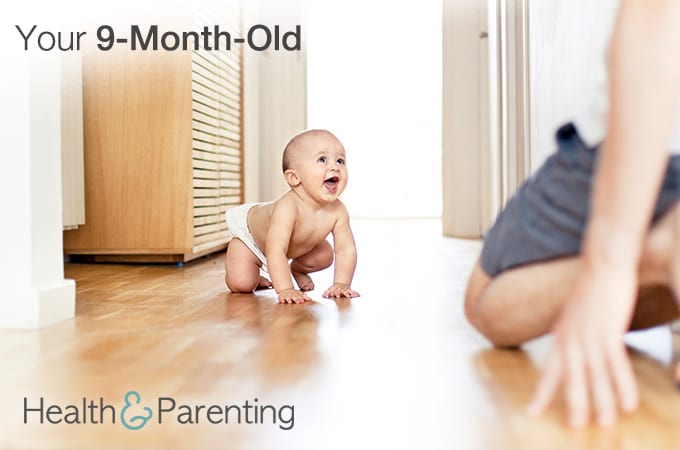Your baby will soon be a year old. So much has changed over the last several months! Here’s what you can expect around 9-months-old:
On the Move
Your baby has likely been crawling for a while now, and may be trying to pull to a standing position. Once standing, he may enjoy cruising around the furniture. Hold your baby’s hands and allow him to walk across the room and back with your support! If your baby is a climber, make sure you teach him to climb back down safely. Gate stairs and close doors to keep baby safe.
Your baby can also change positions pretty easily now, from crawling to sitting and then on the move again. Be sure your home is safe for baby to explore. Childproofing is an ongoing battle – just when you think you’ve got it all taken care of, baby reaches another milestone! Crawl around with your baby (who will think it great fun) and check for any hazards.
Other motor skills are improving, too. Your baby has probably mastered the pincer grasp (grabbing small objects with the thumb and forefinger), and can move toys from hand to hand (and then straight to the mouth). Toys that allow them to manipulate objects – stacking cups, sorting toys, building blocks, etc. – will give your baby a chance to work his mind as well as practice his fine motor skills.
Making Conversation
All day long it seems like your baby is talking to you, though you don’t really know what he’s saying. By answering his babbling, you’re teaching him how to converse. Throughout the day, name objects around the house, on your walk, in the grocery store, at the park, etc. Your baby will likely begin to mimic your sounds, eventually saying simple words like ‘mama’ and ‘dada.’
Even though he can’t talk yet, he will be able to understand many words, as well as gestures, facial expressions and tone of voice. Your baby will also start to understand the word ‘no,’ and you may find yourself saying it more often. Setting limits can begin even at this early age.
Stranger Anxiety
Your baby may begin to be wary of new people, and maybe even people he knows but doesn’t see often (like grandparents or a sitter). He may be clingy with you, and may fuss when you try to leave. These are normal changes related to your baby’s growing brain – his awareness of self and others, his memory, and the idea of object permanence are all maturing. Separation anxiety is always worse when baby is tired, hungry or ill. It usually peaks between 10 and 18 months, and is usually gone by age 2.
Mealtime Fun
Your baby is probably a little gourmet, having started solid foods around 6 months. Your baby may enjoy small, soft pieces of food he can feed to himself. He can start to have cheese and yogurt around this time, if you haven’t already introduced them. Breastmilk or formula should still be your baby’s main source of calories, though. He might like to try using a spoon – though he won’t be very good at it yet.
Your baby may also enjoy learning to use a cup around this time. Try to find a cup with handles, which will be easier for your baby to manipulate. Most parents opt for ‘sippy cups’ with spillproof spouts. But you can teach your baby to drink from a straw or even an open cup, too. Simply fill the cup with water and let your baby experiment with it. It will take a while before he’s proficient enough to take all his liquid from cups.
Written by Michelle, childbirth instructor, lactation consultant, and mother to 4 busy kids
This information is not intended to replace the advice of a trained medical doctor. Health & Parenting Ltd disclaims any liability for the decisions you make based on this information, which is provided to you on a general information basis only and not as a substitute for personalized medical advice. All contents copyright © Health & Parenting Ltd 2016. All rights reserved.










